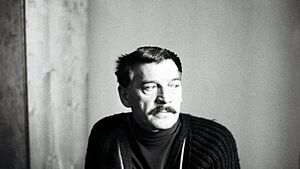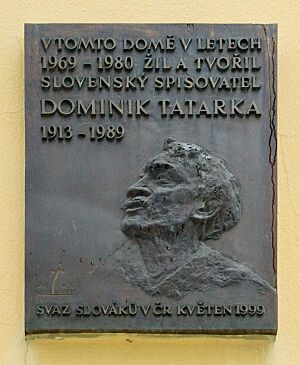Dominik Tatarka facts for kids
Quick facts for kids
Dominik Tatarka
|
|
|---|---|
 |
|
| Born | 14 March 1913 Pelyvássomfalu, Austria-Hungary |
| Died | 10 May 1989 (aged 76) Bratislava, Czechoslovakia |
| Resting place | Martinský cintorín, Bratislava |
| Occupation | Writer, essayist |
| Language | Slovak |
| Education | Charles University Sorbonne University |
| Notable awards | Jaroslav Seifert Prize Order of Tomáš Garrigue Masaryk Order of Ľudovít Štúr |
Dominik Tatarka (born March 14, 1913 – died May 10, 1989) was a famous writer from Slovakia. He is best known for his book The Demon of Consent. This book, written in 1956, made fun of a harsh political system called Stalinism.
Contents
Dominik Tatarka's Early Life
Dominik Tatarka was born in a village called Pelyvássomfalu. This place is now known as Plevník-Drienové in Slovakia. His parents were Jozef Tatarka-Greš and Žofia Tatarková. Dominik was the only boy in his family. He was the second youngest of eight children.
He went to primary school in his home village. Later, he studied at grammar schools in Nitra and Trenčín. After that, he went to university. He studied Slovak and French languages at Charles University in Prague. He also studied at Sorbonne University in Paris, France.
Life After the Communist Takeover
After finishing his studies, Dominik Tatarka became a French teacher. He taught at grammar schools in Žilina and Martin. During World War II, he joined a secret group. This group was the Communist Party of Czechoslovakia. He also took part in the Slovak National Uprising. This was a fight against the government at that time.
In the early 1950s, Tatarka worked as an editor. He wrote for Slovak newspapers like Pravda. He also wrote books and movie scripts. These writings supported the Communist party. They talked about how the party helped defeat fascism. They also praised how the party modernized society. This included changing farms into collective farms.
The Prague Spring Era
At first, Tatarka supported the Communist government. But in the late 1950s, he started to feel differently. He did not like the "cult of personality." This meant leaders were praised too much. He also felt there was not enough open discussion.
In 1954, he wrote The Demon of Consent. This book used humor to show a problem. It talked about people who just followed the crowd. They did not think for themselves. This helped strict governments stay in power.
In the 1960s, Tatarka became a strong supporter of the Prague Spring. This was a time when the Communist party wanted to make things more open. In 1963, The Demon of Consent was published as a book. It became very popular. Tatarka then became a full-time writer. He also translated books by French authors. He wrote movie scripts too.
Facing Hard Times: The Normalization Era
In 1968, armies from the Warsaw Pact invaded Czechoslovakia. They wanted to bring back the old, strict Communist rules. Tatarka led a protest against this invasion. It happened at SNP Square in Bratislava.
After the invasion, Tatarka left the Communist party. He faced many problems from the new government. This time was called normalization. The government wanted to control society again. They saw independent thinkers like Tatarka as a problem. By 1971, he was not allowed to work as a writer. His books were removed from public libraries.
Tatarka had to find other ways to earn money. He worked as a lumberjack and a rubbish collector. The secret police watched him all the time.
Even with these difficulties, Tatarka stayed active. He connected with people who were against the government. He kept writing secret books and papers. This was called samizdat literature. In 1977, he was one of the few Slovak people to sign Charter 77. This was an important document. It asked the government to respect human rights.
Later Life and Legacy
Dominik Tatarka passed away in Bratislava on May 10, 1989. This was just before the Communist government fell. That big change was called the Velvet Revolution. He is buried in the Martinský cintorín cemetery in Bratislava.
Tatarka received several awards for his work.
- In 1986, he got the Jaroslav Seifert Prize.
- After his death, he received the Order of Tomáš Garrigue Masaryk in 1990.
- In 1996, he was given the Order of Ľudovít Štúr.
Since 1995, a special literary award in Slovakia is named after him. It is called the Dominik Tatarka Prize.
In 2013, the Slovak Post made a special stamp. It was to celebrate 100 years since Tatarka's birth. UNESCO also included his birth anniversary on their list of celebrated events.
There is even a small planet named after him! It is called 286162 Tatarka. It was found in 2001.


